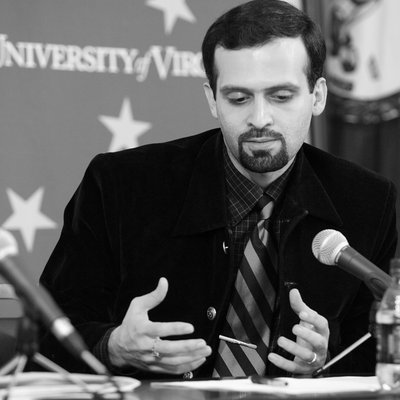
Last Update
Unknown
Organisation
Unknown
Gender
Male
Ethnic Group
Unknown
Religoius Group
Muslim
Province
Tehran
Occupation
Journalist
Sentence
Two years and two days imprisonment and 84 lashes
Status
Released
Institution investigating
Ministry of Intelligence
Charges
Disturbing public order
Propaganda against the regime
Date of Birth
17/3/1978
Roozbeh Mirebrahimi Released
Roozbeh Mirebrahimi is a journalist and blogger who currently lives in the United States. He worked as the political editor for the Etemad newspaper for two years.
Mirebrahimi was arrested on September 27, 2004 for his blogging, and was held in solitary confinement for 60 days by the Tehran Prosecutor’s Office. In 2007, with seven charges still against him, he left Iran and resettled in New York, in the United States.
A year later, in absentia, the court sentenced him to two years and two days in prison as well as 84 lashes.
Before he worked with the Etemad newspaper, Mirebrahimi was the social affairs editor and editor-in-chief of the Iranian parliamentary affairs section for the Tosseh (Development) newspaper. He had previously worked as a deputy in the political affairs section of the Jomhuriat (Republic) newspaper and was editor-in-chief of the Rozna website.
Mirebrahimi was one of four individuals to be tried as bloggers at a time when this form of online activity was just becoming mainstream in Iran. The four individuals, Omid Memariam, Shahram Rafiazadeh, Javad Gholam-Tamimi and Roozbeh Mirebrahimi were arrested because of the content of their blog posts, and were charged with a range of alleged security crimes.
The accusations against Mirebrahimi included, “membership and establishment of groups within Iran that aim to undermine the security of the country,” “propaganda activity against the Islamic Republic of Iran through writing and publishing articles on illegal websites such as Gooya and Emrooz,” “insulting the Supreme Leader,” “spreading lies with the aim of creating agitation among the public and Iranian authorities,” by writing articles for online news websites, as well as “disturbing the public peace and order” though attending illegal and conspiratorial gatherings, “drinking alcoholic beverages” and finally “enabling corruption and having illicit relationships.” Mirebrahimi was also forced to make a televised confession against himself.
Mirebrahimi wrote in his defence statement that, during his interrogations, he was subjected to physical and psychological coercion. He said: “Contrary to what is stated in my indictment, on September 27, 2004, I was arrested as if I were a dangerous criminal in my home, without being presented with a warrant, as part of illegal arrest proceedings. I was forced to endure 60 days in a 1m x 0.2m solitary confinement cell in a secret law enforcement intelligence detention centre under the direct supervision of the Tehran Prosecutor’s Office.”
Mirebrahimi also talked about his televised confession in his defence statement, saying: “I completely deny and withdraw the entirety of the confession and the accusations that were brought against me. Justice dictates that a defendant’s words be cited in free circumstances and not in inhumane and imprisoned conditions.”
Mirebrahimi also wrote about his interrogation and the accusation against him of maintaining illicit relationships. He said: “While I was being subjected to torture, I confessed to having an illicit relationship with a female journalist. But a short while later, whilst I was still in that same prison, I denied that accusation. Today in the presence of the court I once again reaffirm to all those present that these two charges [drinking alcoholic beverages and having illicit relationships] were complete lies. I have not had any illicit relationships and, also fundamental to this accusation, I was married at the time of my arrest. In order to clarify both the views of the public and the honoured judge in this case, it should be remembered that my interrogators were people who have repressed sexual issues. I confessed to illicit relationships at a time when I was subjected to excruciating and overwhelming pressure. And yet, accepting this accusation was not enough for [my interrogators] and they demanded that I describe and detail the entirety of the [alleged] sexual relations in which I participated. When I resisted their demands to write such fabrications, they started to describe the act of sexual relations and requested that I write what they were saying as my confession. It was, in this way, that several of the pages of interrogation records were devoted to describing illicit sexual relations. Do you know why? Because they copied my writing and they distributed it among themselves, reading it with pleasure. My interrogators said that taking confessions on sexual relations and sexuality was a regular and common procedure in all interrogations.”
Mirebrahimi’s court defence statement was published after he had left Iran.
On February 4, 2009, after he had already left Iran, the Branch 1059 of the Revolutionary Court in Tehran, presided over by Judge Hosseini, issued its judgement against Mirebrahimi. The judgement came four years after the beginning of proceedings against him.
In 2007, Mirebrahimi was awarded Hellman-Hammett grant by Human Rights Watch. This prominent human rights grant is given to writers who have been victims of political persecution and harassment. Mirebrahimi has published a number of books including “The Untold Aspects of the 1979 Revolution,” “Reforms Under Eight,” “A Reformist’s Struggle,” “Unspoken,” “Informal Sociology,” “Three Conversations” and “Ahmadinejad: The Devastating Miracle.”